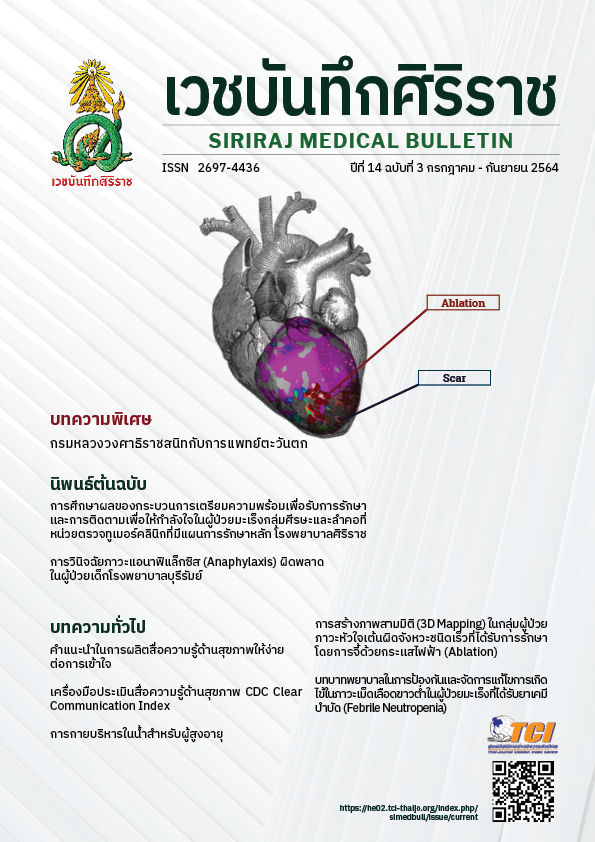The Effect of Mental Support during Pre-treatment and Follow-up in Patients with Head and Neck Cancer Who Visited for Having Standard Treatment Plan at Tumor Clinic, Siriraj Hospital
Main Article Content
Abstract
Objective: The Effect of Mental Support during Pre-treatment and Follow-up in Patients with Head and Neck Cancer who visited for having standard treatment plan at Tumor Clinic, Siriraj Hospital, for identify the cause of treatment rejection and levels of stress in each patient were assessed before and after the visits.
Methods: To study patients with head and neck cancer, aged between 18-75 years at the Tumor Clinic, who have the primary treatment plan amount 120 cases that compared to control group from database of the Tumor Clinic in 2014 amount 120 cases. In the study group, patients were interviewed by using the Mental Support during Pre-treatment and Follow-up specifically designed questionnaires, stress assessment form and Rosenberg's self-esteem assessment form. The statistics were analyzed by Student’s t-test, Chi-Square test and McNemar’s test.
Results: The study group found that 109 (90.8%) of patients received treatment, meanwhile 11 (9.2%) of patients did not receive treatment, the control group found that 102 (85%) of patients received treatment, meanwhile 18 (15%) of patients did not receive treatment. By comparing from 2 group, the study found that the number of patients, who received the treatment was difference but no statistically significant. The reasons for not receiving the treatment were fear of the treatment 46%, including, poor physical condition 20%, chosen an alternative medicine 20%, problem of financial 7% and no caregiver during the treatment 7%. There was difference but no statistically significant between the assessment of stress of patients before and after the examination. The self-esteem was no difference.
Conclusion: The Effect of Mental Support during Pre-treatment and Follow-up result in the patients, who received the treatment was difference but no statistically significant. However, the process of patient follow-up induces the patients who receive care for a better quality of life. Therefore, periodical follow-up made to know and help the patients to resolve the problem for them. This will result in patients receiving treatment as planned.
Article Details
References
ศรีธรรม ธนะภูมิ. ภาวะจิตสังคมของการเจ็บป่วย (Psychosocial aspect of illness) [อินเทอร์เน็ต]. [เข้าถึงเมื่อ 11 พ.ย. 2558]. เข้าถึงได้จาก: https://med.mahidol.ac.th/ramamental/generaldoctor/05302015-1735
ชิษณุ พันธุ์เจริญ. การสื่อสารสำหรับผู้ป่วยมะเร็ง. ใน: ชิษณุ พันธุ์เจริญ, จรุงจิตร์ งามไพบูลย์, บรรณาธิการ. คู่มือทักษะการสื่อสารสำหรับพยาบาลและบุคลากรทางการแพทย์ [อินเทอร์เน็ต]. กรุงเทพฯ: ธนาเพรส; 2552. หน้า 50-4. [เข้าถึงเมื่อ 1 มี.ค. 2559]. เข้าถึงได้จาก: https://www.slideshare.net/UtaiSukviwatsirikul/communication-book-for-pharmacist
J Weis. Support groups for cancer patients [Internet]. Supportive Care in Cancer 2003; 11: 763-8. [cited 2016 Apr 28]. Available from: https://link.springer.com/article/10.1007%2Fs00520-003-0536-7#page-1
รัชนีกร ใจสืบคำ. ผลของโปรแกรมการพยาบาลแบบสนับสนุนและให้ความรู้ร่วมกับการเดินออกกำลังกายต่ออาการเหนื่อยล้า การนอนไม่หลับและความวิตกกังวลของผู้ป่วยมะเร็งเต้านมที่ได้รับเคมีบำบัด. ใน: ธีรวุฒิ คูหะเปรมะ, บรรณาธิการ. วารสารโรคมะเร็ง สถาบันมะเร็งแห่งชาติ [อินเทอร์เน็ต]. ปีที่ 29 ฉบับที่ 4. กรุงเทพฯ: โฆสิตการพิมพ์; 2552. หน้า 152-61. [เข้าถึงเมื่อ 1 มี.ค. 2559]. เข้าถึงได้จาก: https://www.nci.go.th/th/journal/File_Download/pp2.pdf
Bernard, R. (2000). Fundamentals of biostatistics (5th ed.). Duxbery: Thomson learning, 384-5.
Fleiss, J. L., Levin, B., Paik, M. C. (2003). Statistical methods for rates and proportions (3rd ed.). John Wile&Sons, 76.
Ngamjarus C., Chongsuvivatwong V. (2014). n4studies: Sample size and power calculations for iOS. The Royal Golden Jubilee Ph.D. Program – The Thailand Research Fund&Prince of Songkla University.
กรมสุขภาพจิต กระทรวงสาธารณสุข. แบบประเมินความเครียด (ST-5) [อินเทอร์เน็ต]. [เข้าถึงเมื่อ 4 ก.พ. 2559]. เข้าถึงได้จาก: https://www.dmh.go.th/test/qtest5/
ฐปนีย์ ตั้งจิตภักดีสกุล. แบบประเมินการเห็นคุณค่าในตนเองของโรเซ็นเบิร์ก. ใน: สุชีรา ภัทรายุตวรรตน์, ผู้นิพนธ์. คู่มือการวัดทางจิตวิทยา, พิมพ์ครั้งที่ 1. กรุงเทพฯ: เมดิคัล มีเดีย; 2545. หน้า 484-5.
ประคอง กรรณสูต. แบบวัดความรู้สึกมีคุณค่าในตนเอง [อินเทอร์เน็ต]. [เข้าถึงเมื่อ พ.ค. 2561]. เข้าถึงได้จาก: https://www.cumentalhealth.com/index.php?lay=show&ac=article&Id=539909325






